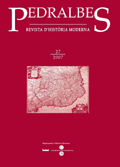Guerra i defensa en temps de penúria: el cas de Mallorca durant el regnat de Carles II. Algunes notes aproximatives
Keywords:
Kingdom of Majorca, Charles II, seventeenth century, War and defence, France, Economic hardship.Abstract
The defenses of the kingdom of Majorca were very weak during the reign of Charles II because of economic hardship, which prevented the islands of Majorca and Minorca from having suitable protection even by the end of the seventeenth century. In Majorca, a good amount of work was undertaken in the fortifications of the city of Palma, unlike Alcúdia. In Minorca both the fortifications and the garrisons of Ciutadella and Mahó found themselves in very poor conditions. Ibiza, on the other hand, had suitable fortifications and artillery since the late sixteenth century, although the garrison was poorly equipped. The pressures from the crown in order to get men and money from Majorca in the war against France were very strong. Majorcans did not openly oppose those subsidies, but, instead, found ways enabling them to postpone their payment as much as possible. Three different situations (those of Majorca, Minorca and Ibiza) are analyzed against a common background: the French navy, increasingly seeking to take some of the islands or, at least, some of their ports, such as Mahó.Downloads
Published
How to Cite
Issue
Section
License
Copyright (c) 2007 Antonio Espino López

This work is licensed under a Creative Commons Attribution-ShareAlike 4.0 International License.
Authors must agree with the following terms:
1. The author keeps authorship rights, ceding the journal the right to first publication.
2. Texts will be disseminated with a Creative Commons Attribution 4.0 International License. Which allows for the work to be shared with third parties, as long as they recognise the work’s authorship, the original publication in the journal and licensing conditions.
This requires acknowledging authorship appropriately, providing a link to the license, and indicating if any changes have been made. It can be indicated in any reasonable way, but not in a manner that suggests the licensor endorses or sponsors the use of the text.
If content is remixed, transformed, or new content is created from the journal's texts, it must be distributed under the same license as the original text



